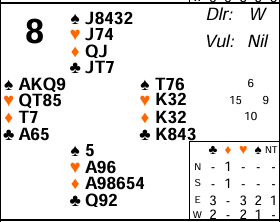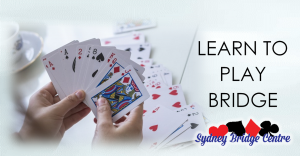City and Canada Bay – Thursday Morning 12th December 2024.

Board 8 last week saw most East West pairs playing in assorted levels of no-trumps. The most common number of tricks made was 8 although the defence could, in theory, have done better. A few were allowed to make 9 tricks.
There’s more interest in the defence on this hand than the bidding but there are some considerations worth discussing in the likely auction.
West has a pretty standard 15-17 1NT opening over which North will pass. It’s then up to East. These days, especially if playing teams, East will probably just bid 3NT (although you ideally need 25/26 points for game many players these days will try with 24 and it often works simply because the defence frequently go wrong – defence is hard!) Here, at matchpoint pairs where the game bonus doesn’t matter as much, it’s not as clearcut. Being so balanced and lacking a major, East might decide to just invite game. How he does that is a matter for partnership agreement – traditionally 2NT was a simple invite but these days that’s more often used to mean other things and invites all start with Stayman followed by 2NT. See advanced section (and last week’s column) for more on this. If East does invite then West is likely to decline holding a minimum for his 15-17 and the pair will then end in 2NT.
Note that if East does start with a 2♣ stayman bid, then South could consider overcalling 2♦. It’s not something I’d recommend though – it’s very risky as there is a known strong hand on his left and an unlimited hand on his right! East is also the only player at the table able to judge for sure whose hand it is. He knows his partner has 15-17 balanced and he knows if he has 1 point (when it’s likely to be the opponents’ hand) or 7 points (when he knows it’s his side’s hand). Yet on both those hands he would normally pass 1NT. The opponents, on the other hand, are guessing whether their partner has the missing points or whether East does! That makes it dangerous for them to come in. Another factor against overcalling is that South’s diamonds aren’t particularly good quality either so he could easily run into a large penalty if the suit sat badly for him. It would, however, work out quite well on this hand.
What about the play and defence in NT then? If North could see his partner’s cards (or if his partner had risked 2♦) he would obviously lead the ♦Q. But there’s no particular reason for him to do that and most Norths led their 4th highest spade. That’s pretty normal although there could be an argument to try something else – see advanced section for why.
The spade runs to declarer’s ♠9. He now has 6 certain tricks in the black suits and the best chance for more is the heart suit. The natural play is a heart towards the ♥K to try and set up some tricks there. South wins the ♥A and, unable to return his partner’s spade suit, has to consider what to do instead. A diamond is not appealing since he wants to preserve his ♦A to beat dummy’s ♦K later. Nor is a club because it risks helping declarer set up his 4th club in dummy. So the best option is probably to just return a heart even though that’s the suit declarer played on. Today that works quite well as North will get in with the ♥J.
Assuming North trusts his partner, the fact South didn’t return a spade should tell him South doesn’t have any more (after all from South’s perspective North could have led from ♠AQxxx originally and a spade return would then be vital). So often you see players get annoyed that their partner didn’t return their suit(!) – but there are sometimes very good reasons for that and those players would do far better if they stopped to work out why partner did what he did! An important part of good defence is being able to appreciate that things may look very different from partner’s side of the table, to anticipate what problems partner may have, and help each other (a lot easier said than done!)
So North should realise there is no future in spades and look elsewhere. Looking at dummy, even though South hasn’t had a chance to signal anything yet, a diamond must be more attractive than a club for the simple reason there are only 3 in dummy compared to 4 clubs. So the ♦Q is a natural switch. Declarer will most likely not cover this, and nor should he cover the ♦J. South can’t then get in for the rest of the diamonds so North (to declarer’s relief!) will then have to switch back to something else.
All that should end up with 8 tricks for declarer – 4 spades, 2 hearts and 2 clubs.
How might the defence do better? Leading the ♦Q initially of course is one way. Now the defence will be able to make all 6 of their diamonds because after ♦Q and ♦J have held the trick, South can get in with ♥A to cash the rest.
After the normal start of a spade there is another thing an imaginative defender sitting South might try though and it could work spectacularly well on this hand! See advanced section for details.
Key points to note
A combined 24 points for 3NT is often worth a shot – especially playing teams where the game bonus is important. Defence is hard so it can frequently make.
Regular pairs should discuss their responses to 1NT – in particular how they show minors and what 2NT means. It doesn’t need to be used as an invite (those hands can all go through stayman).
If you are on lead against NT with a very weak hand, consider trying to find partner’s suit instead of leading yours – he is more likely to have entries to it later.
When one player has opened NT showing a fairly tightly defined point range, their partner is in the most powerful position in the auction – only they know whose hand it is. So be wary of wading in to auctions like that – you could get hurt!
A lot of good defence comes from trusting partner and appreciating he had a reason for what he did or didn’t do. Being able to work that reason out is often the key to defending accurately.
Occasionally ducking unexpectedly can cause declarer to completely misjudge the hand – sometimes with spectacular results! (But sadly more often you just end up looking stupid!)
More advanced
If East decides to invite game, he could start with stayman (even though he doesn’t have a major himself) and then bid 2NT over whatever partner responds. That then frees up an immediate 2NT bid over 1NT to mean something else. One structure I have seen is 2♠ being used for a range probe (2NT response being minimum, other bids being natural and a maximum) and 2NT as a transfer to either minor (opener must bid 3♣ over which responder either passes or corrects to 3♦). Another alternative (my personal preference) is to use 2♠ as a transfer to clubs and 2NT as a transfer to diamonds.
I mentioned North might consider not leading a spade against no-trumps. Why? Because he has such a weak hand. A spade lead could work OK if partner also has some length in the suit because it will get set up. But otherwise it’s going to be hard work to set up long tricks in such a poor suit. The fact North has a very weak hand means he has limited opportunities for entries to reach his long spades even if they could be set up. When you hold a very weak hand in defence to no-trumps it can be worth trying to find your partner’s suit instead – he is more likely to have later entries to his suit than you are to yours.
I said a South defender could try something. Suppose North started with the spade to declarer’s ♠9 and he led a heart to the ♥K. What if South ducked smoothly?! Look at it from declarer’s point of view now. In his mind North “must” now hold the ♥A. So the natural play for him next is to try a heart to the ♥10 playing South for ♥J. But this time that loses to the ♥J with North who switches to ♦Q followed by ♦J. Now South still has that precious ♥A so he can get in to cash the remaining diamonds! That will now be 8 tricks for the defence and a very depressed declarer! Ducks like this can also benefit in other ways – it’s not relevant to this hand but if declarer places ♥A with North that could cause him to then place other cards with South and get the entire hand spectacularly wrong!
Note also that, if that situation were reached, South can signal his unexpected heart entry to North by the diamond cards he plays. He will of course encourage on the ♦Q but on the ♦J he should know diamonds are 6322 because declarer should have at least 2 for his 1NT bid. Hence he knows North will have to switch and he should help him. Hence he should signal with the highest pip he can (♦9) to try to indicate his entry is in the higher of the other two suits (hearts not clubs – North already knows he doesn’t have anything in spades as he would have played his highest spade on the lead at trick 1). North will have seen the ♥K hold in dummy earlier so he might have a hard time believing this(!) but once again he should trust his partner. South has a large number of diamonds he could play under the ♦J and has consciously chosen to play his highest one. North should ask himself why? A good defender will always have a reason for what he does – so North should trust what South is trying to tell him and play a heart. That would complete a spectacular defence, provide a very good story for the bar, and a bulletin article!
Sadly of course, for every time this sort of play works brilliantly, there are probably 10 times where South just ends up looking like an idiot! After all, for all he knows, his partner might have ♥Q and declarer was just trying to score a trick with ♥K. But here that’s not that likely – declarer can usually be relied to start playing on the suit where he has the most chance of tricks. So there is logic in trying to preserve his only outside entry to his long suit. But of course he needs to have thought it through in advance too – a deception like this will only have a chance of working if the duck is completely smooth!
Julian Foster (many times NSW representative) ♣♦♥♠




